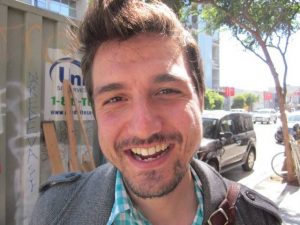Graduate student explores gay literature’s contributions to social movements, canon

When Percy Shelley called poets “the unacknowledged legislators of the world” he was perhaps anticipating the future argument in poetics that pitted those who are interested in the form as primary a matter of aesthetics versus those who view poetry through a political/social lens.
Eric Sneathen, a graduate student in literature, acknowledges that aesthetics and politics are largely inextricable, but that his own scholarship hews more closely to the exploration of the political.
“I am much more interested in literary history and archival work,” Sneathen says. “I enjoy talking to people about their lived experience and then analyze how that lines up, or how it doesn’t, with the literary canon.”
Specifically, Sneathen, who is gay, explores how gay men, beginning in the 1960s, formed a literary community, wrote or curated poems and other literary works about their experiences, and how this community informed the more recent social movements around gay identity.
“It was a self-consciously gay literary culture,” Sneathen says of a movement in the Bay Area after the Stonewall Riots in 1969. “They had their own presses, their own networks and their own literary celebrities.”
Sneathen is thinking of literary figures like Robert Gluck, Kevin Killian, Paul Mariah and Donald Allen. All four were prominent participants in the burgeoning gay literary scene in San Francisco during the 1960s and 1970s.
“These are not necessarily famous writers,” Sneathen says. “But one of the arguments I make in my dissertation is that we should know who these people are and I explore why they have become marginalized.”
Take Donald Allen in particular.
He was not a poet himself, but as an editor, he championed the work of many of the more famous literary artists of his day.
“He was an editor and a tastemaker,” Sneathen says. “We typically don’t talk about editors the same way we do writers, but that is to our deficit.”
Allen worked for a 16-year spell at Grove Press and was tremendously influential in what the imprint brought to press including translating the famed absurdist dramas of French playwright Eugene Ionesco. He edited the works of the poet Frank O’Hara, a dynamic poetic talent and leader of the “New York School” of poetry. But Allen spent much of his adult career in San Francisco, where he helped edit self-consciously gay poetry and prose, but also helped shape the work of authors like Jack Kerouac, Gary Snyder, Charles Olsen, Joanne Kyger and Richard Brautigan.
“One thread of my argument is that through the underground gay community, people like Allen drew on their social life to produce gay literature, but even straight poets like Charles Olsen came into Allen’s orbit through his connection to gay poets,” Sneathen says.
So Sneathen’s book is not as much of an investigation into the aesthetic concerns of the gay literary culture in San Francisco in the 1960s and 1970s as it is an investigation into how the social milieu of the social movement helped produce a distinctive literary movement.
“When you get to the ’70s social movement writers, they are sometimes writing from this confessional expressive mode and they are dismissed as a result,” Sneathen says. “They were not achieving these impersonal standards of the various avant-garde movements at the time. There was a tension between the avant-garde, which was arguing for doing away with the personal, and minority writers and feminists, who were insisting the personal and political were inextricable.”
Sneathen’s work also explores the ways in which one movement was sanctioned by the academy as canon, while the other movement was viewed as a fringe with its inclusion viewed as debatable.
“I think gay literature, like feminist literature or ethnic literature, were viewed as supplements to canonical literature,” Sneathen says. “That can be true of course, but it can also be true that the contributions of gay authors are fundamental to the canon as we know it.”
But as Sneathen wrestles with “questions about authorship and literary production,” he is busy producing his own literary works as well. At the end of the month, a book by Camille Roy edited by Sneathen is slated for publication. Called Honey Mine, the book is a collection of experimental short stories with explicitly lesbian and queer themes.
He published a book of poetry called Snail Poems, calling it an extended elegy for a friend who died in Morrocco while working for the U.S. Peace Corps. He authored another chapbook I Fill This Room With the Echo of Many Voices, a collection of sonnets that explores the unfair stigmatization of Gaetan Dugas, who was misidentified as “Patient Zero” for the North American Aids epidemic.
Sneathen says the poems allowed him to wrestle with the implications of perceptions around a historical figure, which in turn, allowed him to contextualize his own biography. Growing up in San Diego, he realized as early as sixth grade that he was “very clearly attracted to men.”
“I came out to two close friends in 8th grade and I was really quiet about it until about 10th grade,” he says.
Then he came out more generally to his entire class, an uncommon move at the time, but one that has had profound implications on his creative work and scholarship, both of which continue apace.
“I have been fortunate enough to work on books about specific questions in my own life and that my writing around these questions and problems has been of interest to other people,” he says.
Original Link: https://news.ucsc.edu/2021/06/poetry-sneathen.html?utm_source=06-29-2021&utm_medium=email&utm_campaign=tuesday-newsday
